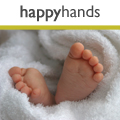Baby Clinic
Baby Care
Baby skincare and allergies
Your baby’s skin is so soft and delicate you are unlikely to need reminding that it should be treated with care.
Yet in our efforts to keep our babies safe and clean, we sometimes rush to cleanse with unnecessary detergents that a baby’s skin just doesn’t need. Indeed, for many parents whose babies have sensitive skin, bathtime can be far from relaxing with so many ingredients to avoid.
Baby skincare do’s and don’ts
- Keep your baby’s skin clean. But this doesn’t have to mean a full bath every night – a couple of times a week with topping and tailing inbetween is usually fine in the first months.
- No soap necessary. There are many lovely baby bubble baths and organic washing sets, but your baby’s skin rarely needs anything other than a swish of water. If you do use bath foam or bath oil, try to use baby-friendly ones which only have natural ingredients and which avoid chemicals and minerals as these can dry the skin or even irritate it.
- If your baby’s skin is dry… A mix of cold weather and dry air from central heating in the home can make your baby’s skin dry out. If this is the case, reduce the number of baths you give your child, try to keep the home more airy without letting it get draughty, and use an unscented cream like aqueous cream to clean your baby’s skin.
- If you are buying organic… look for Soil Association approval as this will ensure that all the ingredients have been certified organic, not just a few.
- Avoid talc. If you want to use a baby powder when changing your baby, use one of the increasing number of talc-free options.
- For cradle cap… Try to overcome this dry skin on your baby’s head by gently rubbing in an organic pure olive oil. If it persists you might need to get a medicated shampoo just until it clears.
- Dress your baby in layers so that in hot rooms or warmer weather the skin does not get too clammy as this can lead to sore patches. Also, avoid choosing woollen clothes next to the skin and opt for breathable natural fabrics like soft cottons for your baby’s clothes, especially if your baby has dry skin or patches of eczema.
- Wash your baby’s clothes in a gentle detergent that has been approved by the British Skin Foundation.
If your baby suffers from eczema
Many small children and babies have eczema, at least in some areas of their body like their ankles, behind knees or on their arms. Although you do not want to use medicated creams all the time, used sparingly, weak steroid creams can help clear up the worst outbreaks. Talk to your GP and ask about weaker steroid treatments. If the skin looks very red, crusty and is weeping, see your GP urgently. Generally, make sure you baby’s bed clothes are cotton, cool and clean. Avoid letting your baby get too hot in layers of bedding or clothes, and use non-biological washing products for anything that might come into contact with his skin.
Related Articles
A Great Day Out at The Baby Show, Excel
Preparing Premature Infants for School
BornFree – the natural approach to bottles
Bottle-feeding: keeping it natural
BabyBjörn venture into drinking cups
Buyer's guide to nappy rash treatments
ReadingZone: best new books published in October
Related Products
Babasling, Limited Print Edition
Baroo, cotbed duvet and pillow set
Related Forum Topics
Forums: Baby
Re: Cranial massage
Clare, Mother of 2, London
Re: fussy eater
Clare, Mother of 2, London
Re: Second hand/ nearly new baby shops??
Clare, Mother of 2, London
Re: does any1 know anything that will help me get my baby into a better sleep routen?
clarejayne, Mother of 1, Nottinghamshire
Reproaching a stranger for bad behaviour to their child.
Patricia6
Have Your Say
Be the first person to comment on this article, just post a comment below.





In order to post a comment you need to be a member. Join Now | Sign in